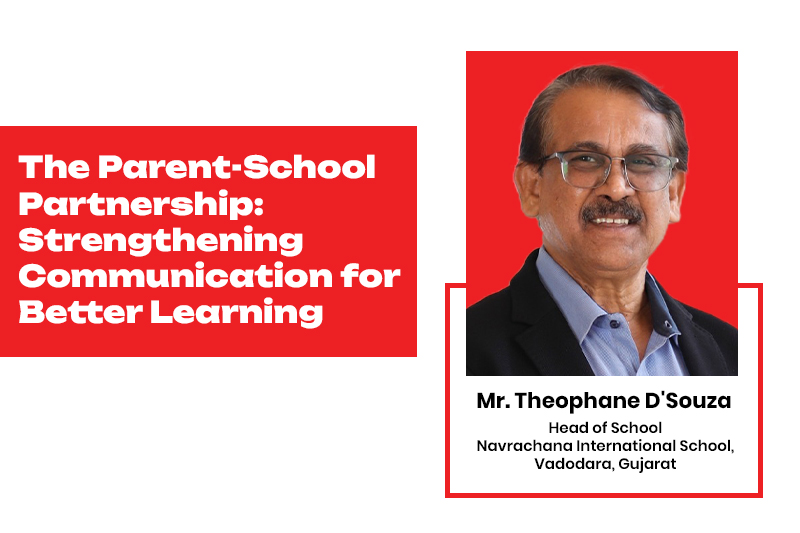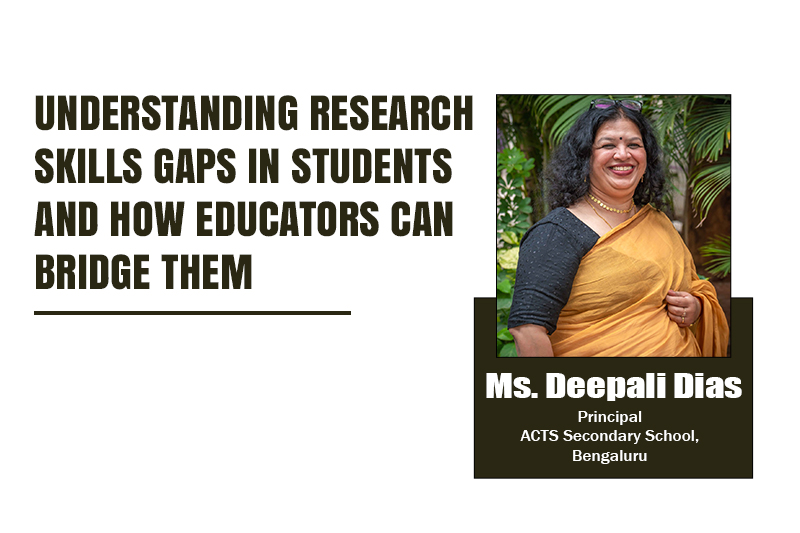The Parent-School Partnership | Mr. Theophane D’Souza, Navrachana International School
Mr. Theophane D’Souza, Navrachana International School, Vadodara
At Navrachana International School, Vadodara, Principal Mr. Theophane D’Souza has consistently emphasized that a strong parent-school partnership is the cornerstone of a thriving learning community. His belief is clear—when families and schools join hands, students not only achieve academically but also grow socially and emotionally. In his view, effective parent-school communication nurtures trust, inspires motivation, and creates an environment where holistic student growth flourishes.
Why Parental Involvement Matters
Mr. D’Souza frequently draws attention to decades of educational research underscoring the importance of parental involvement in education. Studies, he points out, confirm that children with engaged parents demonstrate improved attendance, higher academic performance, and more positive behavioural traits. According to his observations, such students also display resilience, self-confidence, and a deeper connection to learning.
He stresses that this involvement goes beyond academics. Parents who actively participate in their child’s learning journey create a safety net of emotional support. Their encouragement fosters curiosity, self-belief, and responsibility. From his perspective, the benefits of parent engagement in schools ripple into every aspect of a child’s development.
Equally important, he notes, is the sense of trust parents develop when they feel heard and included. Families who see schools as transparent and welcoming partners develop stronger bonds with the institution’s mission and vision. This two-way trust, he explains, cultivates a more unified and supportive environment—one where educators, parents, and students together create a vibrant community of learning.
Strengthening Communication Channels
For parent-school collaboration to be effective, Mr. D’Souza advocates structured, inclusive, and practical strategies. According to him, communication should be ongoing, transparent, and designed to empower parents as partners in education. He recommends several parent-teacher collaboration strategies:
- Regular progress updates: Timely reports on academic and personal development help parents remain connected and informed.
- Structured parent-teacher conferences: These focused discussions allow educators and parents to jointly identify student needs and plan next steps.
- Student-led conferences: By encouraging children to present their learning journey, he believes schools empower them to take ownership of their progress.
- Volunteering opportunities: Parents bring unique skills and experiences that enrich school life. By creating avenues for them to participate, schools foster stronger community ties.
- Digital platforms: Mr. D’Souza highlights the role of apps and portals in enabling real-time, transparent engagement. Such tools bridge gaps between home and school.
- Parenting workshops: Resources and sessions equip parents with strategies to support learning and wellbeing at home.
- Active PTAs: Structured associations provide parents with a platform to voice concerns, offer feedback, and contribute to school decisions.
- Coffee mornings and open houses: Informal interactions help build rapport, trust, and stronger relationships.
- Parent ambassadors: Assigning parent liaisons, he suggests, extends outreach to wider communities.
- Learning-in-action videos: Short clips showcasing classroom activities help parents better understand daily learning experiences.
- Parent panels on key issues: Discussions on topics such as digital safety and student wellbeing deepen understanding and collaboration.
- Experiential learning involvement: Allowing parents to engage in learning activities provides them with insight into student perspectives.
- Parent learning walks: Observing classrooms in real time builds transparency and appreciation for teaching practices.
- Idea boxes: Feedback mechanisms, both digital and physical, ensure parents have a constant channel for input.
From his perspective, such measures reflect the importance of parent involvement in child learning and establish schools as open, responsive ecosystems.
The Impact of Engaged Parents
Reflecting on years of leadership at Navrachana International School, Mr. D’Souza emphasizes the transformative impact of parental engagement. In his assessment, student success through parental support is visible in multiple dimensions—academic achievements, discipline, motivation, and overall wellbeing.
Engaged parents, he observes, contribute directly to:
- Strengthening the sense of belonging: Children thrive when they feel supported by both family and school.
- Promoting collaborative problem-solving: Parents and teachers working together lead to effective solutions for student challenges.
- Elevating performance and confidence: Students supported at home and school exhibit stronger academic and emotional resilience.
He highlights that these contributions go far beyond measurable outcomes. By enhancing the school community through parents, institutions develop a culture of trust, shared responsibility, and collaboration. This culture, he notes, makes schools not just places of learning but also safe, inclusive, and nurturing environments.
Building Trust Between Parents and Schools
For Mr. D’Souza, building trust between parents and schools is not a one-time initiative but a sustained practice. Trust is cultivated through consistent action, openness, and mutual respect. Parents, when treated as valued partners, feel more invested in the school’s journey. Likewise, educators gain a supportive network that strengthens teaching and learning.
In his view, this trust forms the foundation of a robust parent school partnership. It empowers parents to advocate for their child, equips teachers with stronger collaboration, and ensures students feel surrounded by a network committed to their growth.
Conclusion
Mr. Theophane D’Souza’s perspective underscores a simple yet powerful truth: effective parent-school communication transforms education. For him, the essence of this partnership lies not just in meetings, reports, or workshops, but in the co-creation of a shared vision for student growth.
When parents and educators collaborate with intention, schools build a culture of confident, compassionate, and curious learners. These are students who, in his words, “talk the walk and walk it with agency, joy, and purpose.”
The importance of parental involvement in education is no longer a matter of debate—it is an educational imperative. At Navrachana International School Vadodara, this principle continues to guide leadership under Mr. D’Souza, shaping an environment where parent engagement is celebrated, trust is nurtured, and student success is the ultimate goal.





